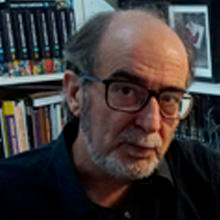“Una caricatura formalmente de alta calidad nunca tendrá un mensaje débil”
Me siento muy afortunado de poder entrevistar a uno de los humoristas gráficos que más disfruto en la actualidad: el español David Vela. (Zaragoza 1967). Él es ilustrador y humorista gráfico, también es investigador y ha publicado varios libros. Podría decir algo que se encuentra fácil en Internet: por ejemplo, que es un humorista que ha obtenido alrededor de medio centenar de premios y menciones en destacados concursos nacionales e internacionales y que sus dibujos han sido seleccionados para exposición y publicados en casi un centenar de catálogos de certámenes de todo el mundo.
Sí, podría decir todo eso de David Vela (a partir de ahora “DV”), pero prefiero comenzar la entrevista para complementar mejor este “prólogo”...
PP: David, para los “humornautas” que nos leen y que quizás no te conocen en esta parte del mundo, ¿cómo debía haberte presentado?
DAVID: Tu presentación es precisa. Profesionalmente soy ilustrador y humorista gráfico, que es lo que me da de comer. Pero también a ratos fui investigador de algunos autores de la historia del humor de la España del primer tercio del siglo XX, algo que me quitó tiempo y dinero, pero me dio muchas satisfacciones personales y un aprendizaje que no está disponible en las academias. Las lagunas e imperfecciones que me supone mi formación autodidacta las he ido solventando en cierta parte por ese bagaje.
PP: La academia es importante, pero más importante es la praxis, digo yo. Por ejemplo, no se adquiere en la universidad el sentido del humor y las formas no se mejoran si no es practicando mucho. Y hablando de formas, ¿prefieres una caricatura de alta calidad en su forma y con un mensaje débil a una de un gran mensaje, pero de poca calidad formal? ¿O viceversa? ¿Por qué?
DAVID: Una caricatura formalmente de alta calidad nunca tendrá un mensaje débil; la calidad artística es en sí misma un fuerte mensaje. Y por otra parte la mediocridad formal jamás logrará comunicar; más bien empañará el concepto. Otra cosa es que estilos muy sintéticos o incluso minimalistas tengan un gran poder de expresión, aunque puedan parecer torpes para el ojo desentrenado. A los humoristas que dominan este tipo estilo sí que los envidio...y por supuesto a los maestros que conjugan calidad formal e ideas de gran potencia.
PP: Me place mucho que estemos tan de acuerdo. El arte por el arte está subvalorado. Y claro, llegar a tener una línea “aparentemente” minimalista y torpe, como dices, después de dominar ampliamente la técnica, es una genialidad. El problema son los mediocres que para ocultar su poco talento, dibujan así y adquieren enseguida pose de que “les da igual las formas, porque lo principal es el mensaje”. Me cuesta mucho digerirlos. Ah, y hay un caso quizás de alta calidad formal que se maneja con frecuencia, mayoritariamente en concursos. Y de ese caso se trata mi pregunta: ¿te sientes más a gusto creando caricaturas sin palabras o que tengan textos? ¿Por qué?
DAVID: Siempre trabajo con dibujos humorísticos sin texto o con el texto mínimo. Quizá por mi formación o por mi carácter tengo cierto complejo con el lenguaje escrito, que me resulta muy intimidatorio... ahora mismo, al escribir estas líneas dudo de cada palabra que voy tecleando. Escribir siempre me ha costado un gran esfuerzo y disciplina. Por contra, el dibujo y la pintura, es en mi caso mucho más gratificante y liberador.
PP: Creo que disimulas bien ese complejo, porque escribes muy claro, no le pongas color a tu dificultad de escribir. Y a propósito de color, háblame un poco sobre el uso del color en tu obra y su importancia, por favor. ¿Me equivoco o te gusta mucho el lila, el violeta?
DAVID: El color es fundamental en mis ilustraciones y dibujos humorísticos. Creo que es uno de mis ingredientes más personales y una lucha permanente en cada uno de los dibujos por encontrar el tono adecuado; básicamente porque renuncio a la línea, que puede ser muy expresiva. Así que el color tiene que ser obligatoriamente expresivo, significativo y en ocasiones simbólico. Respecto a lo del violeta no soy consciente.... no sé si tengo gamas preferidas o no, como dices. Intento darle sentido al color; así por ejemplo, en mi último libro ilustrado Elucidario del silencio, dedicado a la literatura emblemática del Barroco, descarté los azules, para darle un tono determinado, más sobrio, más de época.
PP: Quiero dar un dato que me acaba de llegar procesando esta entrevista: el libro tuyo que mencionas, “Elucidario del silencio” fue galardonado con el Premios al Mejor Libro Editado en Aragón, 2022. Así que te felicito de corazón. Una pregunta: hay humoristas gráficos que se especializan en humor editorial, otros derechamente en humor político, otros en el llamado humor blanco, etc., así que me estuve fijando y como siempre disfrutando de tu obra y veo que te inclinas más al “culturalismo” en el humor (así también califico a tu coterráneo escritor de humor Enrique Gallud Jardiel, el nieto de Jardiel Poncela). Es que veo temas algo recurrentes como los clásicos de la pintura y sus pintores, de la literatura, etc. Además, se nota un humor más poético que lo habitual. ¿Estoy en lo correcto? ¿Es por tu formación como doctor en filología española? ¿O ando muy perdido? Ahora, te confieso que me encantaría que fuera así como digo. Tengo debilidad por ese tipo de humor en cualquier modalidad artística.
DAVID: No andas nada perdido. Mis ilustraciones y mis dibujos de humor vienen marcadas por esa formación. No tanto por el título que apenas me sirvió de nada, como por la investigación que desarrollé para ese doctorado, que estaba ligada a la historia del humor gráfico y la ilustración en España en el primer tercio del siglo XX. En ese periodo el concepto de humorismo tenía una acepción bastante más amplia que hoy y no se refería solo al chiste de prensa o al dibujo satírico, sino que incluía otras variantes, incluyendo al dibujo más decorativista o frívolo. Esos años de estudio coincidieron en mi caso con la búsqueda de un estilo como ilustrador y humorista, y creo que fueron determinantes para encontrar un camino al menos personal y diferenciador.
No estoy capacitado, por motivos de salud física y mental, para el humor político, ni para la viñeta diaria de prensa, disciplina en la que tenemos grandes humoristas. Uno vale para lo que vale; y vas aprendiendo a especializarte. No sé si por mi lugar de nacimiento, por mi paisanaje con Goya, siempre tuve gusto por el humor negro, pero también afición al mal llamado humor blanco. No sé si lo llamaría humor poético, pues quizá podría resultar algo pedante para los lectores; yo busco siempre la simplicidad, cierta ingenuidad naif y sin excepción el cuidado formal; pero huyo de lo pretencioso como de la peste. Revisando mis dibujos de lo que me doy cuenta es que expresan mucha perplejidad y dudas ante la realidad; podría llamarse humor perplejo.
PP: Pues hay viñetas tuyas, que siendo naif, las encuentro poéticas. Sobre todo ilustraciones. Y sobre el humor blanco, dices “mal llamado así” y te doy la razón. Pero la etiqueta de blanco, me da igual. Si se entendiera que ese humor puede hacer pensar como el que más, se le haría justicia. Y para añadirle otro condimento al tema: considero que es el más difícil de hacer. Así que me digan que hago humor blanco, es un honor. Y también coincido con la importancia del humor crítico, de la sátira, del humor editorial. Es un humor muy necesario y también admiro a los colegas que lo hacen. Yo no soy bueno tampoco en ese campo… Creo que perdí el hilo de la entrevista, ja, ja… Bueno, continúo. David, has investigado sobre dibujantes de principios del siglo XX y has publicado libros con los resultados de esos trabajos. ¿Por qué los escogistes a ellos y no a otros? ¿Seguirás investigando en esa línea?
DAVID: Te refieres a Salvador Bartolozzi y Rafael Romero Calvet. No sé si los eliges o ellos te eligen; no lo tengo nada claro. Lo que sé es que nunca termina una investigación cuando te metes a fondo.
Aun estoy pendiente de terminar de escribir un libro sobre el madrileño Bartolozzi (calculo que en 2030 lo publicaré si no cae un meteorito antes). Escribí mi tesis sobre él en los años noventa y he seguido recogiendo datos y material durante estos treinta años. Siento que Bartolozzi sea un gran desconocido aquí en mi país, siendo uno de los creadores más importante de la literatura y el teatro para niños en España, inoculando en el género el humorismo como ingrediente principal. Además fue un gran dibujante y escenógrafo de vanguardia. Un artista superior y muy adelantado a su tiempo.
Respecto al malagueño Romero Calvet, es un caso más singular y paradójico. No fue un humorista, sino un dibujante “raro”, influido por la pintura simbolista y el arte macabro. pero de calidad superlativa, y del que estoy todavía pendiente de recabar algunos datos sobre una biografía muy oculta.
Ambos tienen en común su vinculación con Ramón Gómez de la Serna, que fue el iniciador del humorismo literario moderno en España, y al que he dedicado varios libros ilustrados y exposiciones, la última aún inédita, aunque espero que por poco tiempo.
Me hubiera gustado hace años dedicar tiempo a otros como K-Hito, un humorista genial, o José Zamora, un ilustrador decadentista muy sofisticado. Pero supone tiempo y dinero que no tengo, pues por desgracia soy mi propio mecenas. También hubiese querido historiar los salones de humoristas españoles y la labor de su creador José Francés, pero eso ya sería un esfuerzo sobrehumano.
PP: Cabe señalar que alrededor de la figura de Gómez de la Serna se aglutina la “otra generación del 27”, con los humoristas López Rubio, Miguel Mihura, Enrique Jardiel Poncela, Edgar Neville, Antonio Lara (“Tono”) y hasta Ñ-Hito, como mencionas. ¡No sabes cómo me gustaría estudiar ese fenómeno del humorismo hispano! Pero no tengo tiempo ya. Y en tu caso, no dudo que en cualquier momento los premios de los concursos que participas te financien esos proyectos soñados. Mira, por lo que vi, has obtenido premios en concursos de Turquía, Albania, Irán, Ucrania, Bulgaria y Bosnia. También 2 en China, 2 en Brasil, 2 en Serbia y 2 en Bulgaria. Y además, 14 en Portugal y 20 en España. Sin contar este último en Aragón que mencioné. ¿Me falta alguno? ¿Cuál de esos premios es más significativo para ti?
DAVID: Me fio de tus cuentas, aunque faltaría citar alguno conseguido en Italia, como el más reciente: el Premio Especial Alessandro Alfonssi, en la Bienal de Trento.
Todos los premios son una sorpresa y una extraña alegría. Nunca los espero y sigo enviando dibujos humorísticos a los certámenes con la esperanza de repetir esa sensación. Para mí los premios han sido muy importantes pues por distintas causas no he podido publicar con continuidad en medios de prensa, y es una gran satisfacción poder contar con publicaciones de todo el mundo en las que aparezcan mis dibujos.
En muchas ocasiones resulta una experiencia paradójica y aleatoria: imágenes que me parecen ingeniosas y brillantes no son premiadas ni seleccionadas, y otras a las que no les dí excesivo valor, obtienen éxitos. Así que he optado por no confiar excesivamente en mi propio gusto y participar sin más, manteniendo siempre un compromiso de calidad en la factura.
Respecto a los premios más recordados tendré que referirme al primero hace ya más de veinticinco años que por entonces organizaba en España una conocida marca de alcohol, y en el que obtuve un millón de pesetas de la época (unos 6000 euros actuales), lo que resultó un poderoso incentivo para pensar con algo de ingenuidad que podría dedicarme a este arte. En cuanto a los certámenes tengo especial cariño a Portocartoon, el primero en el que obtuve un premio internacional, que luego repetí en otras ocasiones, y cuya organización y trato eran excelentes. Me apenó su cancelación, así que ojalá pueda volver a convocarse en el futuro.
PP: Sí, fue muy triste e indignante la noticia del cierre de PortoCartoon. Lo comentamos en Humor Sapiens. Pero alejémonos de la tristeza. Por ejemplo, ¿puedes contar alguna anécdota relacionada con tu carrera que sea cómica, curiosa o ingeniosa?
DAVID: Me resulta intrigante y a veces divertido comprobar las diferentes percepciones que un mismo dibujo de humor despierta en personas de distintas culturas e ideologías; algo que hoy es posible observar merced a las redes sociales. Un dibujo como mi versión de la Libertad guiando al pueblo, que obtuvo un buen premio y que reflejaba la primavera árabe de hace una década, diez años después cosechaba muchos insultos y rechazo por parte de lectores de facebook en México, que me dedicaban bastantes improperios. Y tal vez este concepto de la diversidad de puntos de vista explican precisamente el éxito de mi dibujo sobre Picasso y Dalí, muy difundido por redes en todo el mundo, sin yo haberlo previsto ni lejanamente. Internautas de todos los países lo ven como un buen ejemplo de aquello de que “todo es según el color del cristal con que se mira”. Pero nunca falta, en todos los casos, una queja airada en distintos idiomas acusándome de ignorante alegando que Picasso jamás pintaría un huevo cuadrado.
PP: Ja, ja. Así es. Te comprendo cuando dices que el que consume tu arte le encuentra disímiles interpretaciones, algo que tú creaste pensando en otra cosa. Me ha sucedido. Recién recibí una carta de la madre de un alumno que en clases leía uno de mis libros infantiles, y me preguntaba qué valores quise enseñarles a los niños con esa historia. Me fue difícil que entendiera que no lo escribí para enseñar nada, que incluso odiaba las moralejas, que lo hice porque me divertí y quería que los chicos se divirtieran conmigo. Pero no la convencí, me comenzó a señalar valores de mi libro… Y sobre las redes, te confieso que casi he logrado ignorar esas cloacas. Moraleja: “Crear bien y olvídate para quién”. De lo contrario, de repente estaremos aplastados, incluso de la autocensura. Y sobre este punto: una pregunta de moda: ¿cuáles son los límites del humor para ti (si crees que los hubiera, por supuesto)? Y… ¿te han censurado alguna vez? ¿Funciona en ti mucho la autocensura?
DAVID: Si está de moda es porque desgraciadamente a todos afecta. No debería haber ningún límite si se comprendiera cabalmente lo que es el humor; por desgracia esa comprensión cada vez es más limitada y las redes sociales van imponiendo una especie de monstruo llamado censor universal que no entiende de humor o ironía al extinguirse los matices. En ese entorno sobrevive bien el humor maniqueo, la mala leche, el chiste grosero y la agresión cómica, pero el humorismo más sofisticado va desapareciendo. Precisamente la escencia del mejor humor está en el ingenio; en los matices, en la ironía, el doble sentido... aspectos sofisticados que la inmediatez de las redes anula. Por el tipo de humor que practico no he sufrido incidentes de importancia, aunque alguno lo hubo. Pero consciente o inconscientemente creo que voy interiorizando la autocensura. Seguro que sí. La precariedad de la profesión y la falta de amparo por parte de la leyes no ayudan a lo contrario, aunque haya gente muy echada palante y corajuda que yo admiro.
PP: Dices, “aspectos sofisticados del humor que la inmediatez de las redes anula”. Es cierto, pero para mí debe ir acompañada la “inmediatez” con la decadente calidad de la educación y la cultura en estos tiempos. Me gustó mucho eso que dijiste: “No debería haber ningún límite si se comprendiera cabalmente lo que es el humor”. Es la primera vez que me responden con esa idea, por lo menos tan claramente. Usaré esa frase, sin dudas (dándote crédito, obvio). Y a propósito de cómo están las cosas en la actualidad, ¿cómo ves el presente y el futuro del humor gráfico en el mundo?
DAVID: Aunque cada país tendrá sus propias dificultades, en el entorno que yo conozco se presenta profesionalmente complejo y muy precario. Amenazado por una parte por la citada autocensura y por otra por la banalización que parece se va imponer con el abuso de las inteligencias artificiales, preparadas para jubilar al gremio de ilustradores y humoristas en cualquier momento. No obstante, tengo fe en que el genio artístico por una parte y el ingenio y los matices que indiqué antes, propios de los buenos humoristas, no puedan ser extinguidos por ninguna tecnología. Sí no tal vez haya que como utilizar como último recurso humoristas ciborgs.
PP: Por ahora, tengo dudas de que una máquina llegue a sustituir al humorista, pero se avanza tanto en ese sentido y se desprecia tanto “lo humano”, que no me sorprendería que nos reemplacen en algún momento... Amigo mío, ¿hay alguna pregunta que no te hice y que te hubiera gustado que te hiciera? Si es así, ¿puedes responderla ahora?
DAVID: No.
PP: Para finalizar este “diáloco”, ¿puedes decirles unas palabras a nuestros seguidores de Humor Sapiens?
DAVID: Antes que nada quiero aprovechar para felicitarte por el décimo cumpleaños de Humor Sapiens. Espero que vengan muchas décadas más de humor y contenidos tan interesantes y sabrosos como los que has publicado en estos diez años.
Si son seguidores tuyos seguro que valoran y seguirán considerando el humor como un ingrediente fundamental para sobrevivir con cierta lucidez al peso de la realidad. Así que solo puedo solicitarles que sigan amparando y manteniendo su interés por la labor de los profesionales del humor y por la de quienes como tú la divulgan y apoyan.
PP: Muchísimas gracias y dobles, por las felicitación por nuestro Aniversario y por tus generosas palabras sobre nuestro trabajo… Estimado David, espero que no hayas sufrido con esta entrevista. Te agradezco infinitamente tu buena disposición para compartir aquí y te deseo muchísimos éxitos más en tu carrera. Te lo mereces. Considérame tu fan incondicional.
DAVID: Gracias Pepe. Tanto como sufrir no; un poco de dolor placentero. Espero no haber aburrido a tus lectores. Un privilegio que me hayas tenido en cuenta. Salud y dinero para ti y todos los que te siguen.
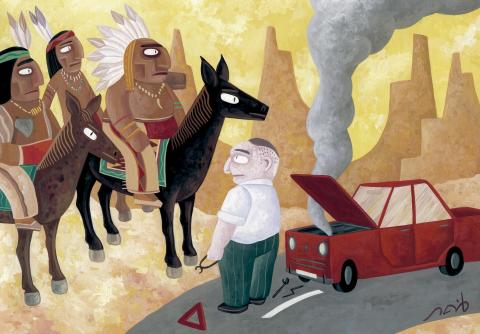
Indios... David Vela
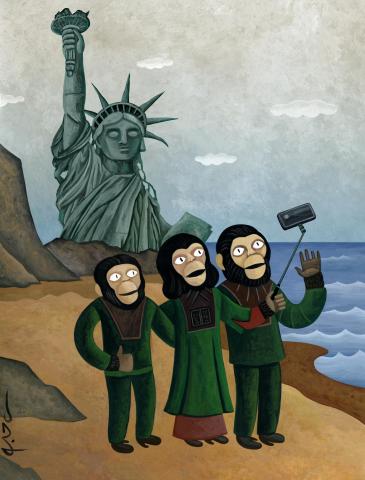
Simios... David Vela
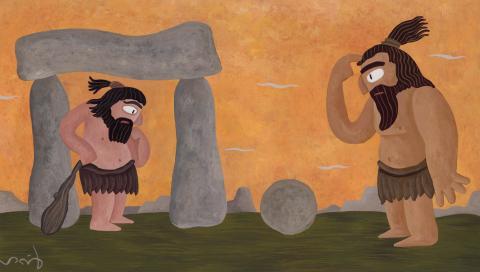
Troglodita... David Vela
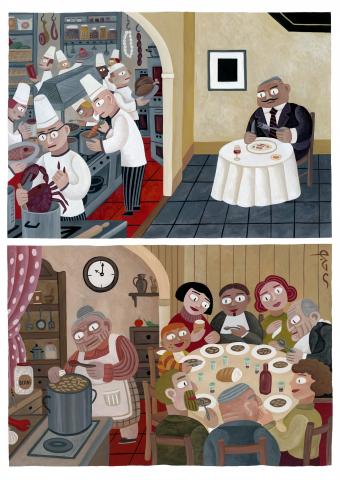
Cocineros... David Vela
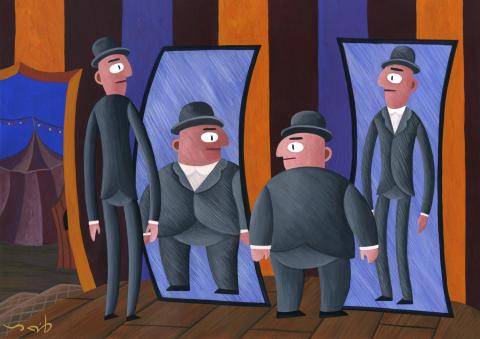
Mirror... David Vela
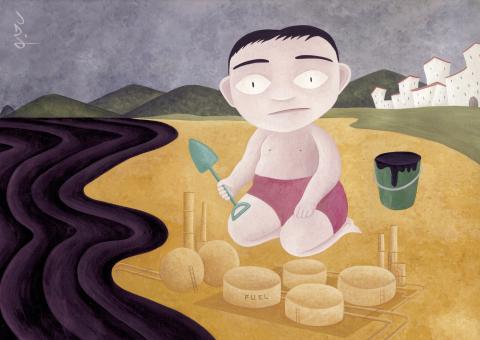
Primer premio Curuxa Gráfica, Galicia 2003... David Vela.
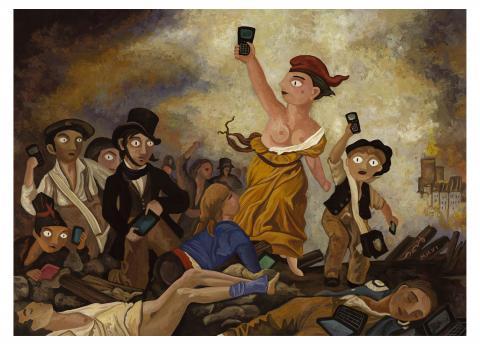
Segundo Premio, World Press Cartoon, Portugal 2012... David Vela.
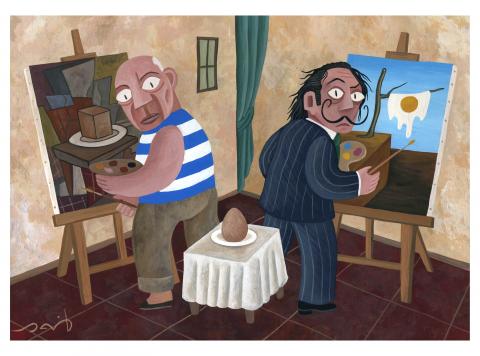
Tercer Premio, World Press Cartoon, Portugal, 2014... David Vela.
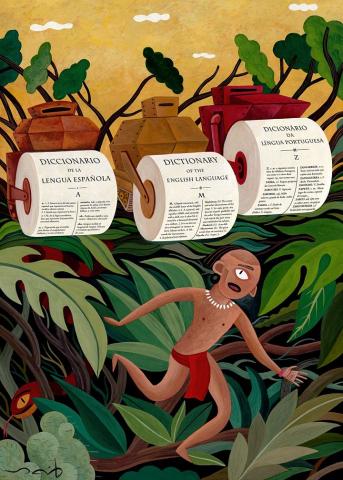
XXI PortoCartoon , 3º Premio... David Vela.
Interview with David Vela.
By Pepe Pelayo
“A formally high-quality cartoon will never have a weak message”
I feel very lucky to be able to interview one of the cartoonists that I enjoy the most today: the Spanish David Vela. (Zaragoza 1967). He is an illustrator and cartoonist, he is also a researcher and has published several books.
I could say something that is easy to find on the Internet. For example, he is a comedian who has obtained around fifty awards and mentions in prominent national and international competitions and that his drawings have been selected for exhibition and published in almost a hundred catalogs of competitions around the world.
Yes, I could say all that about David Vela (from now on “DV”), but I prefer to start the interview to better complement this “prologue”…
PP: David, for the “humornauts” who read us and who may not know you in this part of the world, how should I have introduced you?
DV: Your presentation is precise. Professionally I am an illustrator and graphic comedian, which is what fuels me. But at times I was also a researcher for some authors of the history of humor in Spain in the first third of the 20th century, something that took up my time and money, but gave me a lot of personal satisfaction and learning that is not available in academies. I have been solving the gaps and imperfections that my self-taught training entails to a certain extent due to that baggage.
PP: Academies are important, but praxis is more important, I say. For example, a sense of humor is not acquired at university and forms are not improved without practicing a lot. And speaking of forms, do you prefer a cartoon with high quality in its form and with a weak message to one with a great message, but of poor formal quality? Or vice versa? Because?
DV: A formally high-quality cartoon will never have a weak message; artistic quality is in itself a strong message. And on the other hand, formal mediocrity will never be able to communicate; rather it will cloud the concept. Another thing is that very synthetic or even minimalist styles have great power of expression, although they may seem clumsy to the untrained eye. I do envy the comedians who master this type of style...and of course the teachers who combine formal quality and powerful ideas.
PP: I am very pleased that we agree so much. Art for art's sake is undervalued. And of course, being able to have an “apparently” minimalist and clumsy line, as you say, after largely mastering the technique, is genius. The problem is the mediocre ones who, to hide their lack of talent, draw like this and immediately acquire the pose that “they don't care about the shapes, because the main thing is the message.” I have a hard time digesting them. Oh, and there is perhaps a case of high formal quality that is handled frequently, mostly in contests. And in that case is my question: do you feel more comfortable creating cartoons without words or that have texts? Because?
DV: I always work with humorous drawings without text or with minimal text. Perhaps because of my training or my character, I have a certain complex with written language, which I find very intimidating... right now, as I write these lines, I doubt every word I type. Writing has always cost me great effort and discipline. On the other hand, drawing and painting are, in my case, much more rewarding and liberating.
PP: I think you hide that complex well, because you write very clearly, don't add color to your difficulty in writing. And speaking of color, tell me a little about the use of color in your work and its importance, please. Am I wrong or do you really like lilac, violet?
DV: Color is fundamental in my illustrations and humorous drawings. I think it is one of my most personal ingredients and a permanent struggle in each of the drawings to find the right tone; basically because I renounce the line, which can be very expressive. So color has to be expressive, meaningful and sometimes symbolic. Regarding the purple thing, I'm not aware... I don't know if I have favorite ranges or not, as you say. I try to make sense of the color; Thus, for example, in my latest illustrated book Elucidation of Silence, dedicated to the emblematic literature of the Baroque, I discarded the blues, to give it a certain, more sober, more period tone.
PP: I want to give you a piece of information that I just received while processing this interview: your book that you mention, “Elucidario del Silencio” was awarded the Best Book Published in Aragón Awards, 2022. So I congratulate you from the bottom of my heart. But let's get back to our point. There are graphic comedians who specialize in editorial humor, others directly in political humor, others in the so-called white humor, etc., so I was paying attention and as always enjoying your work and I see that you lean more toward “culturalism” in the humor (this is also how I describe your fellow humor writer Enrique Gallud Jardiel, Jardiel Poncela's grandson). The thing is that I see somewhat recurring themes such as the classics of painting and their painters, literature, etc. In addition, there is a more poetic humor than usual. I am right? Is it because of your training as a doctor in Spanish philology? Or am I very lost? Now, I confess that I would love it to be as I say. I have a weakness for that type of humor in any artistic form.
DV: You are not lost at all. My illustrations and my humorous drawings are marked by that training. Not so much because of the title, which was hardly useful to me, but because of the research I developed for that doctorate, which was linked to the history of graphic humor and illustration in Spain in the first third of the 20th century. In that period, the concept of humor had a much broader meaning than today and did not refer only to press jokes or satirical drawings, but included other variants, including more decorative or frivolous drawings. Those years of study coincided in my case with the search for a style as an illustrator and comedian, and I think they were decisive in finding a path that was at least personal and differentiating.
I am not qualified, for reasons of physical and mental health, for political humor, nor for daily press cartoons, a discipline in which we have great comedians. One is worth what one is worth; and you are learning to specialize. I don't know if because of my place of birth, because of my countryman's acquaintance with Goya, I always had a taste for black humor, but also a fondness for the so-called white humor. I don't know if I would call it poetic humor, because perhaps it could be somewhat pedantic for readers; I always look for simplicity, a certain naive ingenuity and, without exception, formal care; But I flee from pretentiousness like the plague. Reviewing my drawings, what I realize is that they express a lot of perplexity and doubts about reality; It could be called perplexed humor.
PP: Well, there are vignettes of yours, which, being naive, I find poetic. Especially illustrations. And about white humor, you say “badly called that” and I agree with you. But the white label, I don't care. If it were understood that this humor can make you think like anyone else, justice would be done. And to add another spice to the topic: I consider it to be the most difficult to do. So being told that I do white humor is an honor. And I also agree with the importance of critical humor, satire, editorial humor. It's much-needed humor and I also admire colleagues who do it. I'm not good in that field either... I think I lost the thread of the interview, ha ha... Well, I continue. David, you have researched cartoonists from the early 20th century and have published books with the results of those works. Why did you choose them and not others? Will you continue investigating along those lines?
DV: You are referring to Salvador Bartolozzi and Rafael Romero Calvet. I don't know if you choose them or they choose you; I have it not clear. What I know is that an investigation is never finished when you dig deep.
I'm still waiting to finish writing a book about Bartolozzi from Madrid (I estimate that I will publish it in 2030 if a meteorite doesn't fall first). I wrote my thesis on him in the nineties and have continued collecting data and material over these thirty years. I feel that Bartolozzi is a great unknown here in my country, being one of the most important creators of literature and theater for children in Spain, inoculating the genre with humor as a main ingredient. He was also a great avant-garde draftsman and set designer. A superior artist and far ahead of his time.
Regarding Romero Calvet from Malaga, it is a more unique and paradoxical case. He was not a humorist, but a “strange” cartoonist, influenced by symbolist painting and macabre art. but of superlative quality, and of which I am still waiting to gather some data on a very hidden biography.
Both have in common their connection with Ramón Gómez de la Serna, who was the initiator of modern literary humor in Spain, and to whom I have dedicated several illustrated books and exhibitions, the last one still unpublished, although I hope for a short time.
Years ago I would have liked to dedicate time to others like K-Hito, a brilliant comedian, or José Zamora, a very sophisticated decadent illustrator. But it takes time and money that I don't have, because unfortunately I am my own patron. I would also have liked to chronicle the salons of Spanish comedians and the work of their creator José Francés, but that would be a superhuman effort.
PP: It should be noted that the “other generation of 27” gathers around the figure of Gómez de la Serna, with the comedians López Rubio, Miguel Mihura, Enrique Jardiel Poncela, Edgar Neville, Antonio Lara (“Tono”) and even Ñ -Hito, as you mention. You don't know how I would like to study this phenomenon of Hispanic humor! But I don't have time anymore. And in your case, I do not doubt that at any time the prizes from the contests you participate will finance those projects. Look, from what I saw, you have won prizes in competitions in Turkey, Albania, Iran, Ukraine, Bulgaria and Bosnia. Also 2 in China, 2 in Brazil, 2 in Serbia and 2 in Bulgaria. And also, 14 in Portugal and 20 in Spain. Not counting this last one in Aragon that I mentioned. Am I missing any? Which of those awards is most meaningful to you?
DV: I trust your accounts, although it would be necessary to mention some achieved in Italy, such as the most recent: the Alessandro Alfonssi Special Prize, at the Trento Biennale.
All the awards are a surprise and a strange joy. I never wait for them and I continue sending humorous drawings to competitions in the hope of repeating that feeling. For me the awards have been very important because for various reasons I have not been able to publish regularly in the press, and it is a great satisfaction to be able to have publications from all over the world in which my drawings appear.
On many occasions it is a paradoxical and random experience: images that seem ingenious and brilliant to me are not awarded or selected, and others to which I did not give excessive value, obtain successes. So I have chosen not to rely excessively on my own taste and simply participate, always maintaining a commitment to quality in the invoice.
Regarding the most memorable awards, I will have to refer to the first one more than twenty-five years ago, which at that time was organized in Spain by a well-known alcohol brand, and in which I obtained one million pesetas at the time (about 6,000 euros today), which It was a powerful incentive to think with some naivety that I could dedicate myself to this art. As for the competitions, I am especially fond of Portocartoon, the first in which I won an international award, which I later repeated on other occasions, and whose organization and treatment were excellent. I was saddened by its cancellation, so I hope it can be reconvened in the future.
PP: Yes, the news of the closure of PortoCartoon was very sad and outrageous. We discussed it in Humor Sapiens. But let's get away from sadness. For example, can you tell an anecdote related to your career that is funny, curious or witty?
DV: I find it intriguing and sometimes fun to see the different perceptions that the same humorous drawing awakens in people of different cultures and ideologies; something that is possible to observe today thanks to social networks. A drawing like my version of Liberty leading the people, which won a good award and which reflected the Arab Spring of a decade ago, ten years later garnered many insults and rejection from Facebook readers in Mexico, who directed many expletives at me. . And perhaps this concept of the diversity of points of view explains precisely the success of my drawing about Picasso and Dalí, widely disseminated through networks all over the world, without me having even remotely foreseen it. Internet users from all countries see it as a good example of that "everything is according to the color of the glass through which you look." But there is always, in every case, an angry complaint in different languages accusing me of being ignorant, alleging that Picasso would never paint a square egg.
PP: Ha ha. That's how it is. I understand you when you say that those who consume your art find different interpretations of something that you created thinking about something else. It has happened to me. I just received a letter from the mother of a student who read one of my children's books in class, and she asked me what values I wanted to teach the children with that story. It was difficult for me to understand that I didn't write it to teach anything, that I even hated morals, that I did it because I had fun and I wanted the kids to have fun with me. But I didn't convince her, she started pointing out values from my book... And regarding the networks, I confess that I have almost managed to ignore those sewers. Moral: “Create well and forget for whom.” Otherwise we will suddenly be crushed, even by self-censorship. And on this point: a fashionable question: what are the limits of humor for you (if you think there are any, of course)? And... have you ever been censored? Does self-censorship work a lot on you?
DV: If it is fashionable it is because unfortunately it affects everyone. There should be no limits if we fully understood what humor is; Unfortunately, that understanding is becoming more and more limited and social networks are imposing a kind of monster called a universal censor that does not understand humor or irony as nuances become extinct. In this environment, Manichean humor, bad temper, rude jokes and comic aggression survive well, but the more sophisticated humor is disappearing. Precisely the essence of the best humor is in wit; in the nuances, in the irony, the double meaning... sophisticated aspects that the immediacy of the networks nullifies. Due to the type of humor that I practice, I have not suffered any major incidents, although there have been some. But consciously or unconsciously I think I am internalizing self-censorship. For sure yes. The precariousness of the profession and the lack of protection by the law do not help the opposite, although there are very brave and courageous people that I admire.
PP: You say, “sophisticated aspects of humor that the immediacy of the networks cancels out.” It is true, but for me “immediacy” must be accompanied by the declining quality of education and culture in these times. I really liked what you said: “There should be no limits if what humor is is fully understood.” It is the first time that this idea has been answered to me, at least so clearly. I will use that phrase, without a doubt (giving you credit, obviously). And speaking of how things are currently, how do you see the present and the future of graphic humor in the world?
DV: Although each country will have its own difficulties, in the environment that I know it is professionally complex and very precarious. Threatened on the one hand by the aforementioned self-censorship and on the other by the trivialization that seems to be imposed with the abuse of artificial intelligence, prepared to retire the guild of illustrators and comedians at any moment. However, I have faith that artistic genius on the one hand and the ingenuity and nuances that I indicated before, typical of good comedians, cannot be extinguished by any technology. Yes, no, perhaps we should use cyborg comedians as a last resort.
PP: For now, I have doubts that a machine will ever replace the comedian, but so much progress has been made in that sense and “the human” is so despised, that I would not be surprised if they replace us at some point... My friend, is there Any questions that I didn't ask you and that you would have liked me to ask you? If so, can you answer it now?
DV: No.
PP: To finish this “dialogue”, can you say a few words to our followers of Humor Sapiens?
DV: First of all I want to take the opportunity to congratulate you on the tenth birthday of Humor Sapiens. I hope there are many more decades of humor and content as interesting and tasty as those you have published in these ten years.
If they are your followers, they surely value and will continue to consider humor as a fundamental ingredient to survive the weight of reality with a certain lucidity. So I can only ask you to continue protecting and maintaining your interest in the work of humor professionals and in that of those like you who disseminate and support it.
PP: Thank you very much and double, for the congratulations on our Anniversary and for your generous words about our work... Dear David, I hope you have not suffered with this interview. I thank you infinitely for your willingness to share here and I wish you many more successes in your career. You deserve it. Consider me your unconditional fan.
DV: Thanks Pepe. As much as suffering no; a little pleasant pain. I hope I haven't bored your readers. A privilege that you have taken me into account. Health and money for you and all those who follow you.
(This text has been translated into English by Google Translate)

